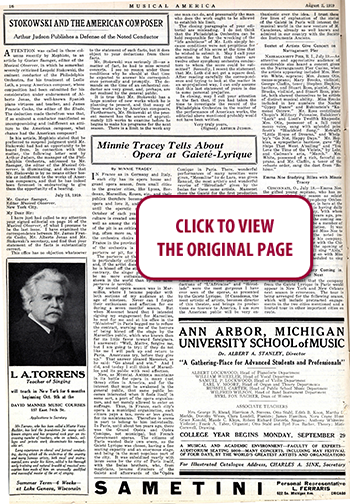 100 YEARS AGO IN MUSICAL AMERICA (297)
100 YEARS AGO IN MUSICAL AMERICA (297)
August 2, 1919
Page 16
STOKOWSKI AND THE AMERICAN COMPOSER
Arthur Judson Publishes a Defense of the Noted Conductor
ATTENTION was called in these columns recently by Mephisto, to an article by Gustav Saenger, editor of the Musical Observer, in which he somewhat severely criticized Leopold Stokowski, the eminent conductor of the Philadelphia Orchestra, for his treatment of Leslie Loth, a young American composer, whose composition had been submitted for his consideration under endorsement of Alberto Jonas, the well-known Spanish piano virtuoso and teacher, and James Francis Cooke, the editor of the Etude. The deduction made therefrom was that, if so eminent a conductor manifested so uncompromising and indifferent an attitude to the American composer, what chance had the American composer?
In his article, Mephisto stated that he preferred to suspend judgment until Mr. Stokowski had had an opportunity to be heard from. In connection with this matter, the following letter sent by Arthur Judson, the manager of the Philadelphia Orchestra, addressed to Mr. Saenger, the editor of the Musical Observer, is illuminating, and shows that Mr. Stokowski is by no means either hostile or indifferent to the works of American composers, and that he has indeed been foremost in endeavoring to give them the opportunity of a hearing.
July 15, 1919.
Mr. Gustav Saenger,
Editor Musical Observer,
New York City.
My Dear Sir: I have just had called to my attention your signed editorial on page 16 of the Musical Observer, of what I presume to be the last issue. I have, examined the correspondence between Mr. James Francis Cooke, Mr. Alberto Jonas and Mr. Stokowski’s secretary, and find that your statement of the facts is substantially correct.
This office has no objection whatsoever object to your deductions from those facts.
Mr. Stokowski was seriously ill—as a matter of fact, he had to miss several concerts. I see no reason under those conditions why he should at that time be expected to answer his correspondence personally and promptly. The demands on the time of an orchestral conductor are very great, and, perhaps, are not realized by the general public.
It is true that Mr. Stokowski has a large number of new works which he is planning to present, and that many of these works are by American composers. Furthermore, Mr. Stokowski at the present moment has the scores of approximately 125 works to examine before he begins to make his programs for the next season. There is a limit to the work any one man can do, and presumably the man who does the work ought to be allowed to establish his limit.
The closing paragraphs of your editorial are misleading. I do not think that the Philadelphia Orchestra can be held responsible for the wrecking of the “life ambitions” of Mr. Loth simply because conditions were not propitious for the reading of his score at the time that he wished to submit it. May I call your attention to the fact that there are twelve other symphony orchestra conductors to whom the score could be submitted? Secondly, I resent the statement that Mr. Loth did not get a square deal. After reading carefully the correspondence and trying to look at the matter in an unprejudiced way, I can only assume that this last statement of yours is due to some personal prejudice.
In closing, may I call your attention to the fact that, if you had taken the time to investigate the record of the Philadelphia Orchestra in the matter of the performance of American works, the editorial above mentioned probably would not have been written.
Very truly yours,
(Signed) ARTHUR JUDSON.




 RENT A PHOTO
RENT A PHOTO





